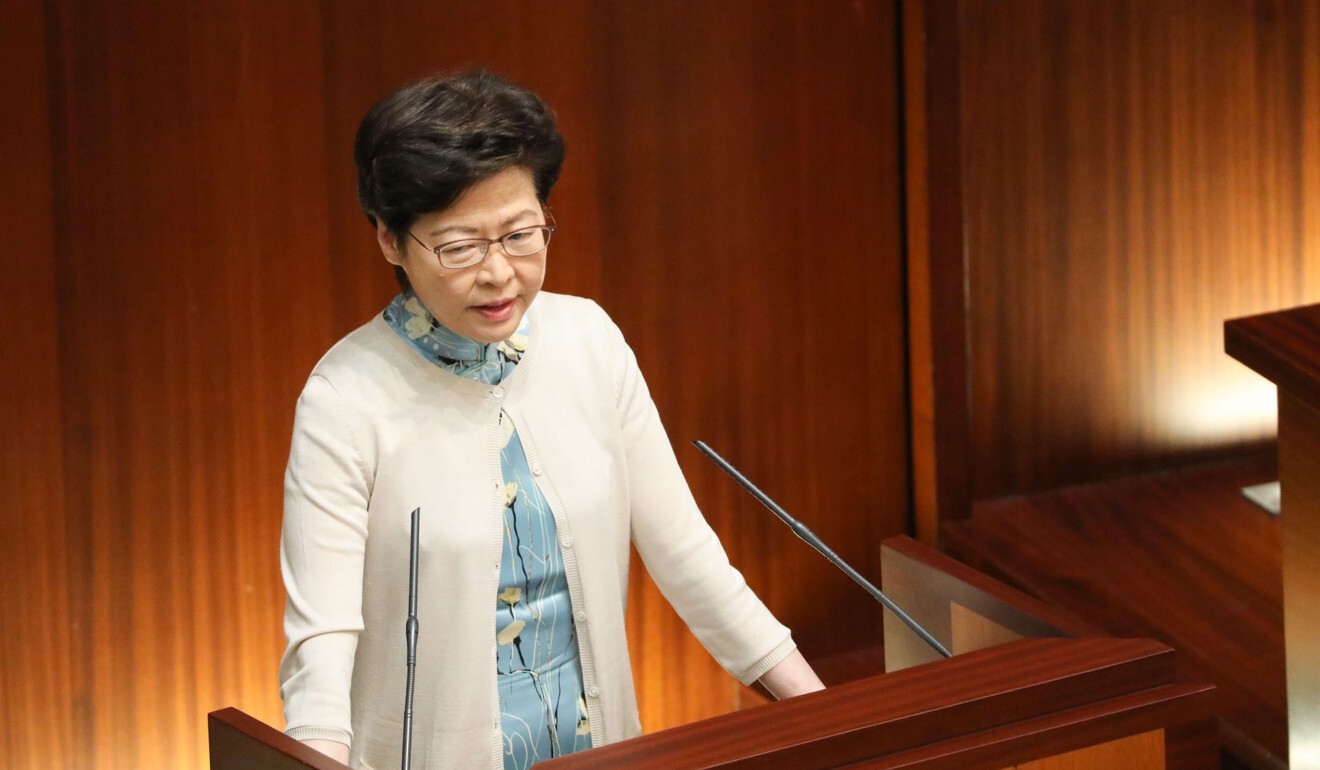
Carrie Lam pledges to focus on Hong Kong’s housing woes in final year of term
- Maintaining land supply key to solving long-standing issue, city leader says, vowing to prevent ‘fragmentation of responsibilities’ among departments
- Her own administration has shown ‘determination and courage’ on the issue, chief executive tells lawmakers
“What we need to fundamentally solve the housing problem in Hong Kong is not any expedient measure, but the determination to maintain the land supply,” she told lawmakers at a Thursday question and answer session.
“We need the courage to insist on our policies despite the short-term economic fluctuations or the ups and downs in property prices.
“The incumbent administration has demonstrated its determination and courage, and I hope the next government can carry on our beliefs.”

Lam’s remarks came against the backdrop of mounting speculation she was warming up to run for another five-year term next March.
Last week, she raised eyebrows by suggesting her swansong policy address in October would offer a “visionary” outlook for Hong Kong’s next five to 10 years.
On Thursday, she vowed to use the remainder of her term to tackle housing, including strengthening oversight from the highest level of government to avoid an internal “fragmentation of responsibilities”.
Financial Secretary Paul Chan Mo-po has been chairing the Steering Committee on Land Supply, which coordinates the land-sourcing efforts of multiple departments.
In her policy address last November, Lam said she would personally steer the internal coordination so that all bureaus would make increasing land supply their top priority.
Explainer: What landlords, tenants have to look out for under new rent-control law
Revisiting the issue on Thursday, Lam also said the city should both speed up the development of its highway and railway networks in the coming year and strengthen urban renewal efforts to deal with problems associated with ageing buildings.
She also pledged to personally supervise the construction progress of public housing to fast-track completion. Under the existing framework, the head of housing reports to the chief secretary while the head of development, responsible for sourcing land, reports to the financial secretary.
Pro-establishment lawmaker Alice Mak Mei-kuen, of the Federation of Trade Unions, urged Lam to “demonstrate her said courage” by reintroducing a bill to tax vacant flats in a bid to punish developers who leave units empty amid soaring prices – an idea originally backed by the government but shelved last year.
But Lam flatly dismissed the calls, saying: “Bold and rash are two sides of the same coin. I should not reintroduce something which, based on our assessment, could hardly achieve the goal and gain support from society.”
Pointing to the 11 months left of her term, Lam said readily acquiescing to Mak’s suggestion could prompt speculation she intended to seek re-election.
Also on Thursday, Adam Kwok Kai-fai, executive director of Sun Hung Kai Properties, suggested that officials set up a committee to oversee progress towards meeting the city’s 10-year target on housing supply, with someone held accountable if the objectives were not met.
He also proposed establishing a cross-departmental body to accelerate the development of new towns, which was supported by committee members.
“Even if [the government] has the determination to solve [the city’s housing crisis], it also needs a blueprint and a team to help authorities do so,” he told a round-table discussion on housing. “These options will help turn the government’s determination into reality.”
Hong Kong’s housing land supply at 10-year low, setting stage for spiralling home prices
Lam, meanwhile, also made it clear again that she would not expand the city’s anti-bribery laws to cover her own chief executive position, which she pledged to do in her election manifesto four years ago.
“I would not do it, and the future chief executives should not do it as well,” Lam said. “The chief executive’s constitutional status should not be weakened.”
The rejection of the earlier promise came hot on the heels of a recent controversy in which three high-ranking security officials were exposed as having violated the city’s coronavirus social-distancing rules by attending a dinner at a luxury clubhouse.
The officials were fined for the infraction, and despite suggestions from a lawmaker and a former anti-corruption investigator that they had also violated ministerial and civil service codes on accepting “lavish entertainment”, Lam has insisted no further action be taken against them.
Democratic Party chairman Lo Kin-hei slammed Lam for reneging on her promise, likening her stance to “planting the seeds of bribery”.
Lam, whose five-year term ends next June, has not yet said whether she plans to seek another term and no one has come forward to challenge for the position, though her predecessor, Leung Chun-ying, is rumoured to be considering a comeback.
Rising rents, high moving costs hammer families stuck in subdivided flats
The two have offered conflicting visions of how to handle the housing issue, with the chief executive in May shooting down Leung’s controversial push to build flats on the fringes of a country park, saying her administration had adopted a long-term, sustainable approach to increasing land supply.
“Some [previous] governments examined the feasibility of converting land use on a plot-by-plot basis … But we believe we have to make long-term plans to find new land, instead of only changing the usage of particular [plots],” she said at the time.
Separately, Lam also hailed what she called the efficiency of the Legislative Council over the past three months, noting that the body – which saw its opposition members resign en masse in November – had passed 17 bills, including one paving the way for Beijing’s radical overhaul of the city’s electoral system.
The current Legco could be the most efficient in 20 years if it managed to pass 18 more bills before its summer recess, she said. There are currently 13 pieces of legislation under scrutiny and five more yet to be tabled.


